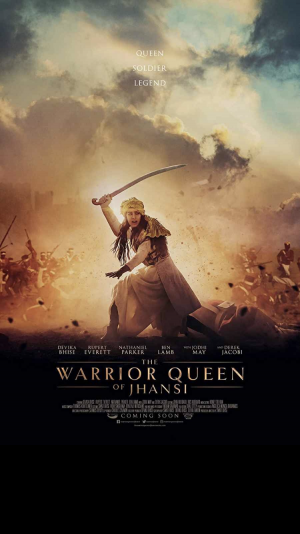“A superb film. A little fairytale-ish. It may over glorify her. It
does not over emphasize the cruelty of the British. Shows
Queen Victoria as a moderate, thinking woman with lots of
humanity. Wish they had located Jhansi for us!”
“The phrase ‘labor of love’ has been elevated to an Olympian
height! I loved this film. It struck a perfect balance of history
and myth making, personal and magic. A real pleasure!”
“Fascinating saga of a woman that is relatively unknown in the
Western world. Choreography of sword fights is impressive.
Jewelry and costumes were eye catching, especially Rani’s.
Always good to see the story of a strong woman who is a leader
of people.”
“Could have been a good story, but too melodramatic and
repetitious.”
“Bollywood meet Hollywood. Mother and daughter have
combined to make a delectable dish of filmmaking that crosses
all borders and cultures. Bravo!”
“You can read this in a book, but my students learn their news
from their iPhones and perhaps their civics and culture from
movies and TV shows. This film will go far in portraying
historical figures from a very different culture with class, with
humanity and intelligence.”
“I loved the story of the Rani and the cinematography and
acting and costumes. Very much appreciated the epic velocity
of the film.”
“A beautiful thrilling and moving film. This was a wonderful
and enlightening event. The lead actress was powerful and as
were her shadows. The director (ed note: Swati Bhise, who was
our guest at the screening) is an incredible talent and a really
nice person.”
“A poor script ruins the movie. Objected to propagandistic
slant of film.”
“A very interesting story which I knew nothing about. It was
gorgeous. A classic, epic film that was more than history. It
was about dignity, freedom, equality, etc.”
“Delightful guest.”
“OK, perhaps a bit black-and-white in terms of good guys vs evil
overlords, but crazy beautiful colors and a joy to watch.”
“Do women go into battle wearing drop earrings and pearls?”
“Fascinating! We always knew women are wonderful!”
“We need to know this history. We need to know about this
culture.”
“Another wonderful piece of world history.”
“Wow!”
“It was eye candy, lavish, gorgeous, but boring.”
“Wonderful! Among the best films of the semester certainly,
but absolutely the best guest ever! Swati was charming,
informative, revelatory, and God bless her for her Type ‘A’
personality. Glad she is feeling better and please thank her for
joining us!"
That was a strange film. I liked a lot of it, particularly its gorgeous look and sense of place. It began remarkably, but then became odd. I was trying to balance its oddness with the difference between different national cinemas and narrative practices, and I'm sure there is a good deal of that there (even though she said she crafted it for a Western audience). Some things I at first considered strange ellipses may have also been due to budgetary issues. It was strange that the film established Rani as a major warrior without ever showing her in a battle before the major one with the British. At one point we saw the bodies on the battlefield without having seen the battle itself. We saw a good deal of her training women to fight but had little sense of any gendered aspect to the battles themselves, and then there's the issue of where were the men in the society and were there internal conflicts with the notion of a gendered army (if that's what it was).
The film repeatedly asserts Rani's greatness as a commander and warrior but shows very little of her actually fighting and less of her leadership skills. I was expecting what is traditional in films about a smaller or even guerilla force against a larger one, such as displays of ingenuity. Maybe when the Brits marched forward to see that the Indian forces had dug tranches behind them, or planted explosives on the field, or emerged from an unexpected hiding place to hit them from the side or rear, but there was none of that. The Brits marched frontally, stopped and bombarded the fort, and Rani watched, doing little but waiting. In effect the film gave no sense of any strategic or tactical brilliance on her part, beyond the fact that it repeatedly asserted her greatness.
At first I thought that the absence of battle scenes establishing her credentials might be a feminist or nationalist strategy to do things differently from the tradition, now I wonder if it may have been due to budget constraints. But it was visually stunning.







